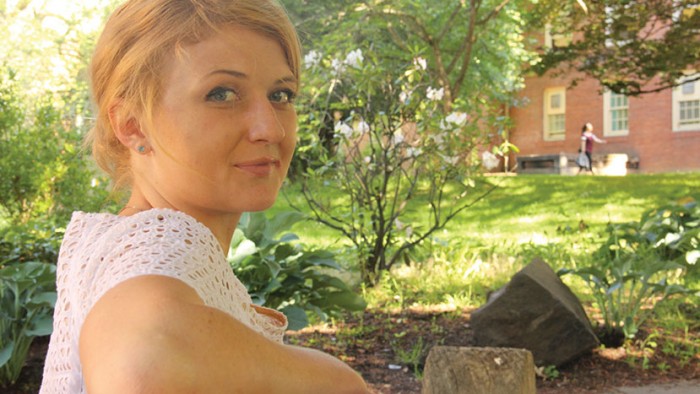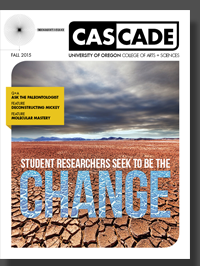Research . . . in the Humanities?

For this annual undergraduate research edition of Cascade, we invited Kaela Thomas (above)—who recently received her degree in French—to write our guest editorial. She gave an impassioned speech at an awards reception in her department and we asked her the question, “What does it mean to conduct research in the humanities?”
When I arrived at the University of Oregon in 2011, like most freshmen, I had a lot of anxiety about declaring my major.
I wasn’t sure what I wanted to do after college, and I was also convinced that whatever major I did declare would certainly define the rest of my life. But just before classes began, I declared a major in the humanities—French—and in spite of all the anxiety accompanying that decision, I felt like a large weight had been lifted from my shoulders, because it was something I already knew I loved and something that would be valuable to study.
Not everyone I met was so sure. The question pops up in conversation: “Well, what are you going to do with that?” It’s not easy to describe what learning another language provides. I would say that it’s like getting to know a part of yourself, and a part of all humankind, that you didn’t know existed.
As a student in the Clark Honors College, I was required to complete a research thesis to graduate. I chose to look at efforts to preserve French in Louisiana.
For many of the people I interviewed, language preservation is their lives. One woman in her seventies had traveled to Normandy. Her grandmother, a French-speaking Louisianan, had always sung to her old medieval battle hymns; she connected with the people she met in France by singing these old songs in French. They have that shared history.
Listening to her story, I was touched. People think humanities research is just about dead, irrelevant people. It’s actually the research of live people and their histories—it’s the study of humanness, of what it’s like to be human. Everyone is connected somehow, and in studying the humanities I’ve seen that firsthand. It has heart—it can affect us on an emotional level, even in the context of writing a huge thesis paper that can be an immense challenge.
Everybody thinks that doing a research project means you’ll be locked in your room and drained of all your energy. But as hard as it was, it was also fun—it was an opportunity for me to make that jump into the adult world, to say, “This is what I found, this is my conclusion, and this is research that I know like the back of my hand.”
It’s a rite of passage. You start school at age five and you graduate when you’re 22, and by then you’ve been listening to other people teach for 17 years. The practical function of research is to turn the tables—you’re the one who is doing, rather than being told what to do. You make that passage from learner to learned. The only way to make that transition is to take things into your own hands.
You can’t just remain someone who is listening forever. Eventually, you’re going to have to talk.
—By Kaela Thomas
caption: In addition to French, Thomas speaks Spanish, Arabic, Japanese, Chinese, German, and just a touch of Klingon; she’s a total Trekkie. She ran the Eugene Marathon—her first—in May. “It was a cool capstone experience for the end of my time in Track Town.” (Photo of Thomas: Matt Cooper)


 Twitter
Twitter Facebook
Facebook Forward
Forward